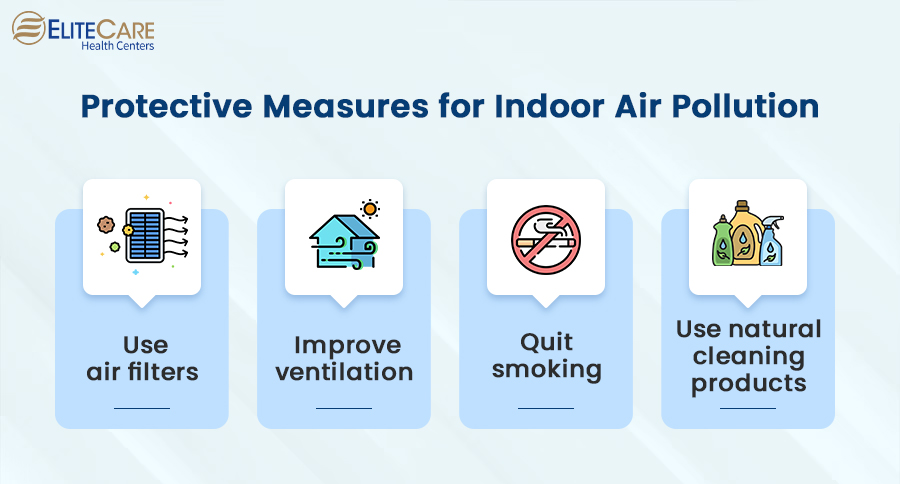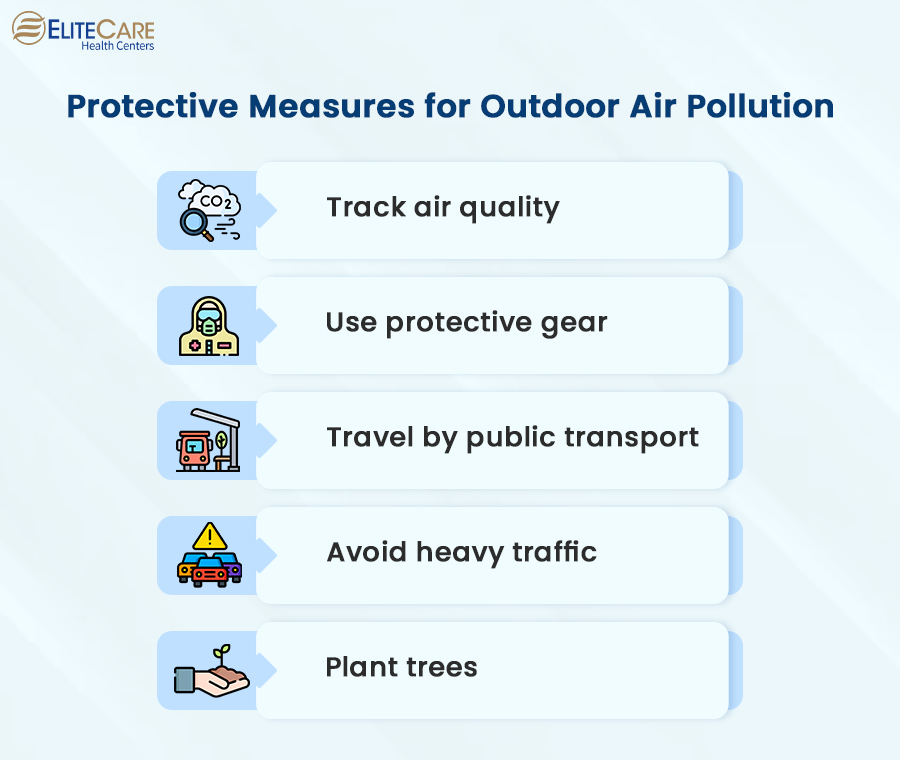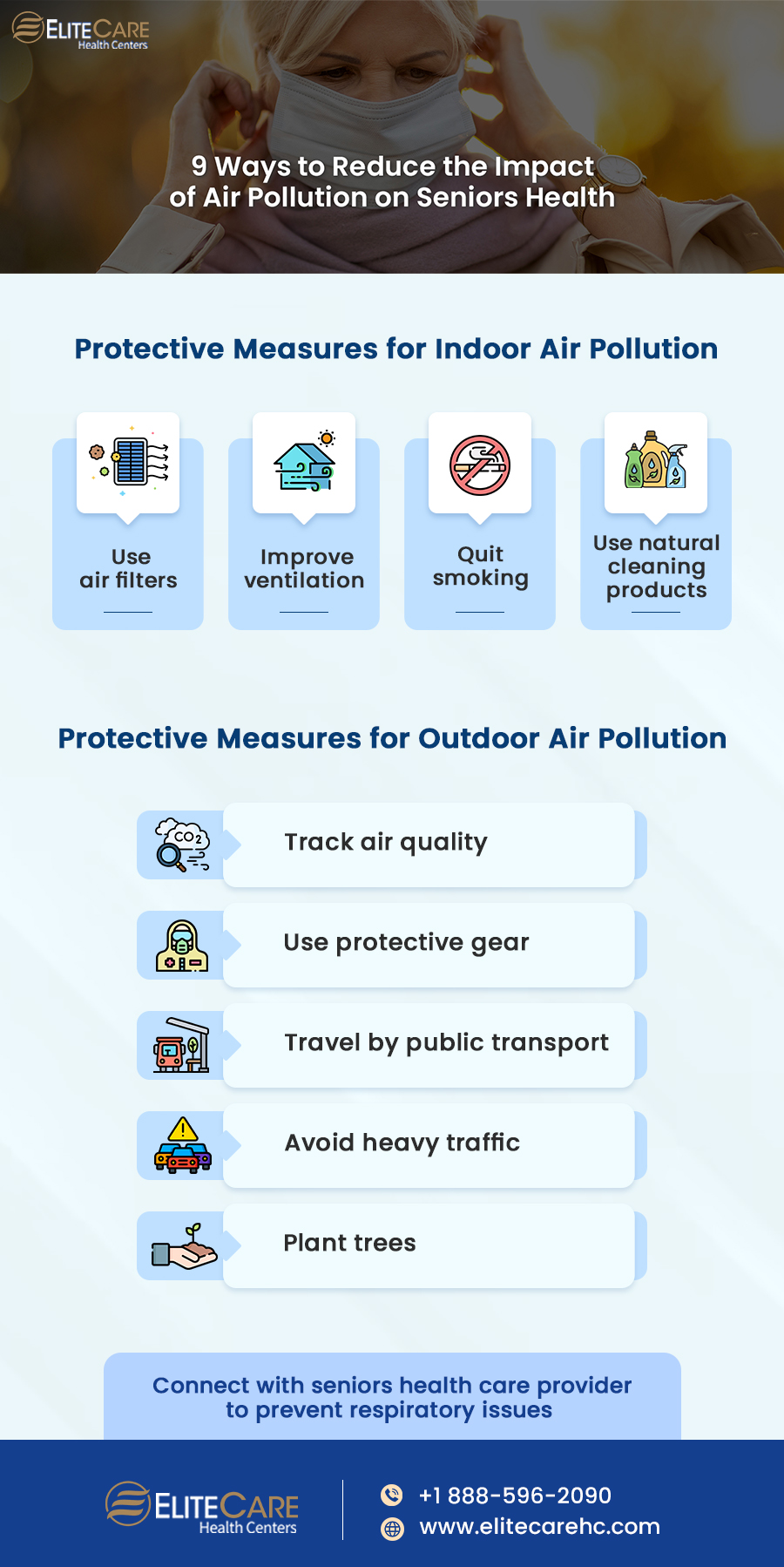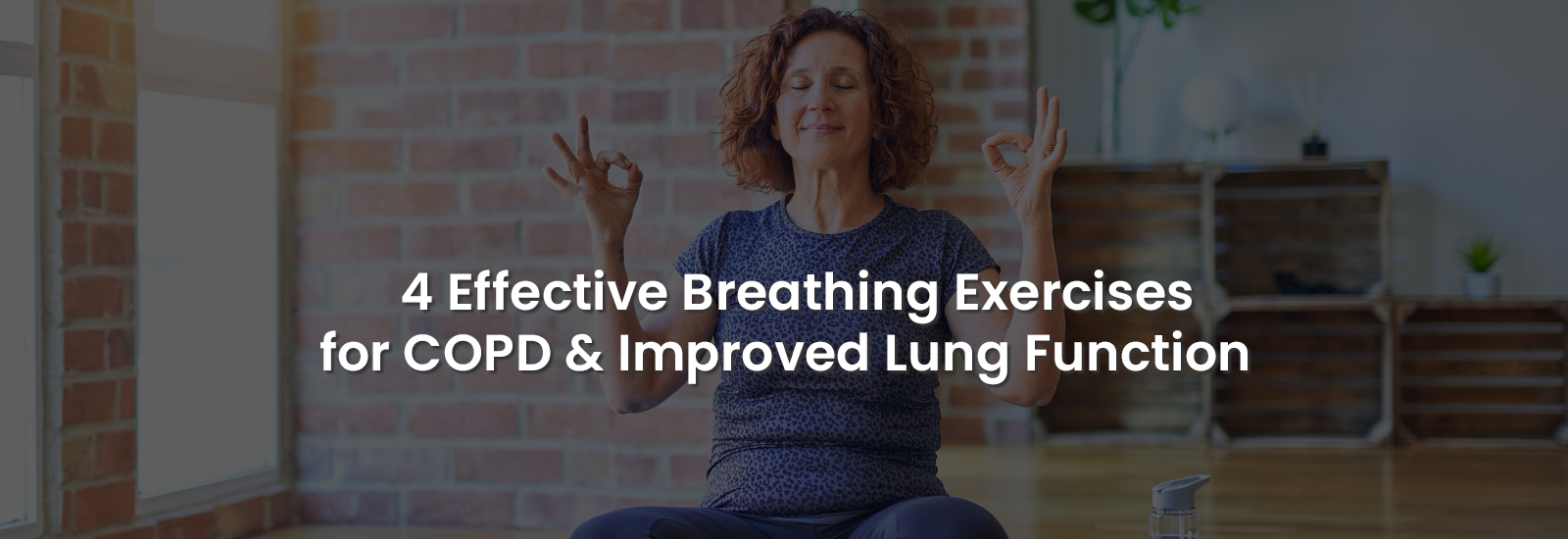
Air pollution is a growing concern worldwide, and its impact on human health cannot be ignored. With age, the body gets more vulnerable to environmental factors, and air pollution can significantly affect everybody’s health. Moreover, Older adults are at high risk of developing respiratory health issues due to weakened immune systems and reduced lung capacity which is aggravated by air pollution. The World Health Organization (WHO) estimates that air pollution causes around seven million premature deaths yearly worldwide, with the elderly being among the worst affected.
Exposure to air pollution has been linked to a range of respiratory diseases, including chronic obstructive pulmonary disease (COPD), asthma, pneumonia, and lung cancer, among others. In this blog post, we will examine the impact of air pollution on seniors’ respiratory health and suggest ways to manage exposure to air pollution and explore treatment options.
What is Air Pollution?
Air pollution is the presence of harmful substances in the air we breathe. These substances, known as air pollutants, can adversely affect human health and the environment. The sources of air pollution can be divided into two categories: natural and man- made. The natural sources include volcanic eruptions, dust storms, and wildfires. On the other hand, human sources include vehicle emissions, industrial processes, power generation, and agricultural activities.
Types of Air Pollutants That Affect Respiratory Health
Also known as overactive thyroid, it occurs when the thyroid gland produces too much thyroxine hormone which can overstimulate the metabolism. Women are 10 times more likely to suffer from this condition than men. Graves’ disease, an autoimmune disorder where the immune system attacks the thyroid gland, is the most common cause of hyperthyroidism in the United States.
Symptoms of hyperthyroidism in seniors include:
- Rapid heartbeat
- Weight loss
- Sweating
- Tremors
- Increased appetite
- Insomnia
Hyperthyroidism can lead to other health problems like atrial fibrillation and osteoporosis. It can also increase the risk of congestive heart failure and stroke in the elderly.
1. Particulate Matter
This is a mixture of tiny particles found in the air, including dust, soot, and smoke. The term PM2.5, which refers to particles with a diameter of 2.5 micrometers or less, is of particular concern as it can be inhaled deep into the lungs and even enter the bloodstream causing respiratory problems such as asthma, bronchitis, and lung cancer.
1. Particulate Matter
This is a mixture of tiny particles found in the air, including dust, soot, and smoke. The term PM2.5, which refers to particles with a diameter of 2.5 micrometers or less, is of particular concern as it can be inhaled deep into the lungs and even enter the bloodstream causing respiratory problems such as asthma, bronchitis, and lung cancer.
2. Nitrogen Dioxide
This gas is primarily produced by cars, trucks, and other vehicles. Exposure to nitrogen dioxide can cause respiratory irritation and exacerbate respiratory conditions by inflaming the airway and reducing lung function.
3. Sulfur Dioxide
This gas is primarily emitted from industrial processes and power generation from burning fossil fuels, such as coal and oil.
4. Ozone
This gas is formed when nitrogen oxides and volatile organic compounds (VOCs) react in sunlight. Ozone can cause airway inflammation and worsen existing respiratory conditions.
5. Carbon Monoxide
This gas is produced by the complete combustion of fossil fuels. Exposure to carbon monoxide can reduce the amount of oxygen the blood carries, leading to fatigue, dizziness, and other health problems.
Protective Measures for Indoor and Outdoor Air Pollution
Seniors are more vulnerable to the harmful effects of air pollution. Here are some protective measures that seniors can take:
Indoor Air Pollution

1. Use air filters
Air filters are an effective way to reduce the concentration of indoor air pollutants. It captures the particles in the air, such as dust, pollen, pet allergens, and other pollutants, trapping them in the filter. Different types of air filters are available, including HEPA (High-Efficiency Particulate Air) filters, electrostatic filters, and activated carbon filters. HEPA filters are the most effective at capturing small particles, such as those found in smoke. They are recommended for those with allergies or respiratory problems. It is essential to choose the right size and type of filter for the home and to replace the filter regularly to ensure it remains effective. Most filters need replacement after every 3 to 6 months, depending on the manufacturer’s recommendations.
2. Maintain good ventilation
To minimize the accumulation of indoor air pollutants such as dust, mold, and chemicals, it is important to have proper ventilation that circulates air effectively. Open windows and doors whenever possible, particularly when cooking or using cleaning products. This allows fresh air to circulate through the home and helps to remove pollutants that may be present. Additionally, using exhaust fans and chimneys in bathrooms and kitchens can help to remove moisture and reduce the risk of mold growth.
3. Avoid smoking
Smoking is generally bad for all. It releases harmful pollutants into the air, such as carbon monoxide, formaldehyde, and other chemicals, which increase the risk of respiratory problems, including lung cancer and chronic obstructive pulmonary disease (COPD). Seniors should quit smoking and avoid secondhand smoke, as it can be harmful, particularly for those with pre-existing respiratory conditions.
4. Use non-toxic cleaning products
Many household cleaning products contain chemicals that can be harmful when inhaled. Switching to non-toxic cleaning products made with natural, plant-based ingredients is safe for people and the environment. They are free from synthetic fragrances, dyes, and other harmful chemicals. In addition to using non-toxic cleaning products, it is essential to avoid using air fresheners or other scented products, which can also release harmful pollutants into the air. Instead, consider using natural alternatives, such as essential oils or fresh flowers, to make your home smell fresh.
Outdoor Air Pollution

1. Stay informed
There are several ways to stay informed when it comes to outdoor air pollution. One way is to check local air quality reports, which can provide information on the level of pollutants in the air and any associated health risks. This information can be obtained from local news outlets, government agencies, and websites that track air quality, such as AirNow.gov. Seniors should also pay attention to weather conditions. High humidity or stagnant air can increase the levels of pollutants. During times of high pollution, seniors should stay indoors and avoid outdoor activities.
In addition to staying informed about air quality conditions, seniors should also stay informed about their respiratory health. Regular check-ups at nearby health and wellness centers can help to monitor any changes in respiratory function and detect potential health problems early on.
2. Use protective gear
Protective gear can include face masks and respirators, which can filter out harmful particles and pollutants from the air. Seniors should select a face mask or respirator designed to filter out delicate particulate matter (PM2.5) and can effectively reduce exposure to air pollution. Choose a mask or respirator that fits well, as poorly fitting masks may not provide adequate protection and may cause discomfort or irritation. Consult senior service provider for guidance on selecting appropriate protective gear according to need.
3. Use public transportation
Buses, trains, and carpools can help reduce the number of vehicles on the road, reducing the amount of air pollution in the environment. Seniors should avoid standing or sitting close to the exhaust of buses or other vehicles, as this can expose them to higher levels of pollutants. Whenever possible, try walking to reduce vehicle emissions exposure and maintain overall health.
4. Avoid areas with heavy traffic
Highways and busy streets produce higher levels of air pollution due to the large number of vehicles and the congestion they create. It is advisable to avoid driving or walking through heavy traffic areas. This may require planning alternate routes or choosing off-peak hours. Using traffic apps or websites can provide real-time traffic updates and suggest alternate routes.
5. Plant trees and vegetation
Trees and vegetation can help absorb air pollutants and produce oxygen. When planting trees and vegetation, choose species that are well-suited to the local environment and can thrive in the area where they will be planted. Native species are often a good choice, as they are well-adapted to the local climate and can provide essential habitats for local wildlife. Planting trees can benefit seniors and the next generation to live pollution-free lives.
Treatment Options for Respiratory Health Issues in Older Adults
Depending on the specific condition and severity of symptoms, several treatment options are available for respiratory disease in seniors. Here are some of the most common treatment options which can be prescribed by physician
1. Medications
Bronchodilators and corticosteroids can help alleviate symptoms of respiratory conditions such as chronic obstructive pulmonary disease (COPD) and asthma. These medications relax the muscles around the airways, making breathing easier.
2. Oxygen therapy
Oxygen therapy can help to improve breathing and alleviate symptoms in older adults with respiratory conditions such as COPD and emphysema. The oxygen is delivered through a mask or nasal cannula and can be administered at home or in a medical clinic.
3. Pulmonary rehabilitation
It is a program that can help to improve respiratory function and quality of life in seniors with chronic respiratory conditions. These programs typically include exercise, breathing techniques, and education on how to manage symptoms.
4. Surgery
In some extreme cases, surgery may be recommended to treat issues such as lung cancer or severe emphysema. Surgery may involve removing a portion of the lung or transplanting a new lung.
5. Lifestyle changes
Quitting smoking, losing weight, and getting regular exercise can help to improve respiratory and overall health.
6. Get vaccinated
Vaccinating against respiratory infections like the flu, pneumonia, and covid can help reduce the risk of complications.
Final Thoughts
Seniors can follow recommendations shared and seek medical attention if any respiratory problems occur health and wellness centers if any respiratory problems occur. Our physicians at EliteCare Health Centers can help prevent respiratory problems and improve their function. Air pollution is a complex issue that requires individual and collective efforts.






